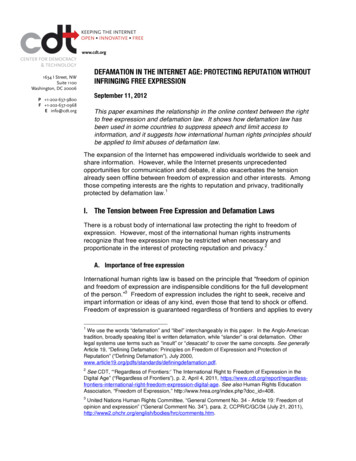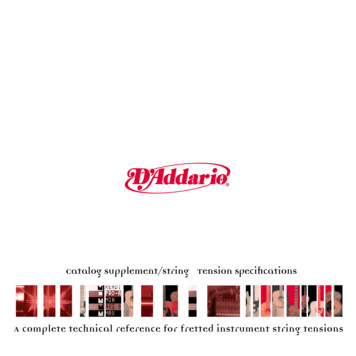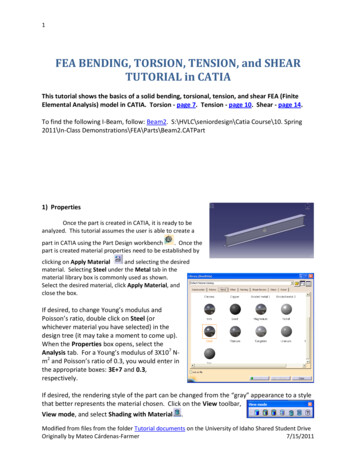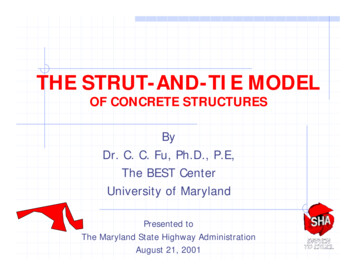
Transcription
DEFAMATION IN THE INTERNET AGE: PROTECTING REPUTATION WITHOUTINFRINGING FREE EXPRESSIONSeptember 11, 2012This paper examines the relationship in the online context between the rightto free expression and defamation law. It shows how defamation law hasbeen used in some countries to suppress speech and limit access toinformation, and it suggests how international human rights principles shouldbe applied to limit abuses of defamation law.The expansion of the Internet has empowered individuals worldwide to seek andshare information. However, while the Internet presents unprecedentedopportunities for communication and debate, it also exacerbates the tensionalready seen offline between freedom of expression and other interests. Amongthose competing interests are the rights to reputation and privacy, traditionallyprotected by defamation law.1I. The Tension between Free Expression and Defamation LawsThere is a robust body of international law protecting the right to freedom ofexpression. However, most of the international human rights instrumentsrecognize that free expression may be restricted when necessary andproportionate in the interest of protecting reputation and privacy.2A. Importance of free expressionInternational human rights law is based on the principle that “freedom of opinionand freedom of expression are indispensible conditions for the full developmentof the person.”3 Freedom of expression includes the right to seek, receive andimpart information or ideas of any kind, even those that tend to shock or offend.Freedom of expression is guaranteed regardless of frontiers and applies to every1We use the words “defamation” and “libel” interchangeably in this paper. In the Anglo-Americantradition, broadly speaking libel is written defamation, while “slander” is oral defamation. Otherlegal systems use terms such as “insult” or “desacato” to cover the same concepts. See generallyArticle 19, “Defining Defamation: Principles on Freedom of Expression and Protection ofReputation” (“Defining Defamation”), July mation.pdf.2See CDT, “ʻRegardless of Frontiers:ʼ The International Right to Freedom of Expression in theDigital Age” (“Regardless of Frontiers”), p. 2, April 4, 2011, ernational-right-freedom-expression-digital-age. See also Human Rights EducationAssociation, “Freedom of Expression,” http://www.hrea.org/index.php?doc id 408.3United Nations Human Rights Committee, “General Comment No. 34 - Article 19: Freedom ofopinion and expression” (“General Comment No. 34”), para. 2, CCPR/C/GC/34 (July 21, ments.htm.
form of media.4 While limited restrictions of this right are allowed, “when a State party imposesrestrictions on the exercise of freedom of expression, they may not put in jeopardy the right itself.”5The Internet has unique potential to promote free expression and access to information.Compared to all previous media, the Internet is defined by its global and decentralized nature, lowbarriers to entry, openness, and relative affordability. Content produced by a single individual oflimited means can find an immediate global audience. These unique characteristics andcapabilities suggest that the laws that were once appropriate for traditional, offline media may notalways be suitable for the wired world.6 Among other concerns, the traditional deference given tolocal norms should be reconsidered when Internet censorship in one country may constitute adirect infringement on the right of persons in other countries to “impart” or “receive” information“without regard to frontiers.”7B. Tension between free expression and defamationHuman rights instruments do not prohibit defamation laws. To the contrary, they implicitly endorsethem by recognizing the rights to reputation and privacy.8 However, if not carefully applied,defamation laws can have a chilling effect on speech, hampering the free expression right of boththose expressing themselves and those entitled to receive information, opinions, and ideas.9Moreover, if speakers are subject to the laws of any country in which their remarks can beaccessed, local defamation laws can pose a risk to free expression globally.104See, for example, Universal Declaration of Human Rights, Article 19 (1948) http://www.un.org/en/documents/udhr/. Foran overview of human rights law and defamation, see Article 19, “Defamation ABC: A Simple Introduction to KeyConcepts of Defamation Law” (“Defamation ABC”), Nov. 2006, ��General Comment No. 34,” note 3 above, para. 21, htm.6United Nations Human Rights Council, “Report of the Special Rapporteur on the promotion and protection of the right tofreedom of opinion and expression, Frank LaRue” (“LaRue Report”), para. 27, A/HRC/17/27, May 16, l/docs/17session/A.HRC.17.27 en.pdf (“For example, in cases ofdefamation of individualsʼ reputation, given the ability of the individual concerned to exercise his/her right of replyinstantly to restore the harm caused, the types of sanctions that are applied to offline defamation may be unnecessary ordisproportionate.”).7Quoted language taken from the Universal Declaration of Human Rights, Article 19. For more on the issues associatedwith the extension of defamation standards across borders, see Sandra Davidson, “International Considerations in LibelJurisdiction,” Forum on Public Policy (Spring 2008) (“Davidson”), pp. 1-2, 8/davidson.pdf, and Eduardo Bertoni, “Determining jurisdiction in Internetdefamation cases: Insights on Latin America,” in “Towards an Internet Free of Censorship: Proposals for Latin America,”(2012) (“Bertoni”) ree-ofCensorship/Jurisdiction Eduardo%20Bertoni.pdf (EN),http://www.palermo.edu/cele/pdf/internet libre de censura libro.pdf (ES).8See, for example, European Convention on Human Rights, 312 U.N.T.S. 221 (Nov. 4, 1950), Articles 8 & tml/005.htm. Relevant language from other human rights instruments isquoted below in Section II.9See Article 19, “Civil Defamation: Undermining Free Expression,” Dec. 9, 2009 (“Civil cations/civildefamation.pdf.10As Judge Martens noted in the “Spycatcher” case, “in this ʻage of informationʼ information and ideas cannot be stoppedat frontiers any longer.” The Observer and Guardian v. the United Kingdom, 14 EHRR 153 (1992).2
The central purpose of defamation law is the protection of reputation.11 A defamation law shouldbe limited to protecting people against “false statements of fact that cause damage to theirreputation.”12 The elements of a defamation claim should be (1) a false statement of a (2) factualnature that does (3) damage to (4) a personʼs reputation through (5) publication to a third party.Defamation laws should be found to violate free expression rights if they seek to protect feelingsrather than reputation or to protect public order rather than private reputation, if they fail to providefor adequate defenses, and if they are applied with disproportionate damage awards.13The tension between defamation law and free expression predates the Internet. As freedom ofexpression includes the right to share “views and opinions that offend, shock, or disturb,”14 craftinga defamation law and applying it in a way that does not violate the principles of free expression aredifficult but essential. Even if a lawʼs standards are reasonable, the mere threat of a defamationsuit can be enough to quiet speech on controversial issues.15 Defamation claims are often used bythe powerful to protect political or economic interests and to silence dissenting voices.16C. Free expression principles should limit the application of defamation lawsInternational and regional human rights officials have called for caution in the application ofdefamation laws. The UN Human Rights Committee has stressed that defamation laws must becrafted with care to ensure that they do not stifle freedom of expression.17 All such laws, theCommittee has said, should include the defense of truth and should not be applied to opinion orother forms of expression that are not, by their nature, subject to verification. The law shouldprovide that government officials and other public figures must tolerate a higher level of criticism,and “[i]n any event, a public interest in the subject matter of the criticism should be recognised as adefence.”18 The United Nations Special Rapporteur on Freedom of Opinion and Expression (“UNSpecial Rapporteur”), along with many other human rights institutions, has called for thedecriminalization of defamation.1911“Defamation ABC,” note 4 above, p. 8-9, www.article19.org/pdfs/tools/defamation-abc.pdf. We do not attempt here afull description of defamation law. For more background, see “Defining Defamation,” note 1 amation.pdf; and Citizen Media Law Project, guide/defamation.12“Defamation ABC,” note 4 above, p. 1, “Defamation ABC,” note 4 above, p. 3, www.article19.org/pdfs/tools/defamation-abc.pdf. Defenses to a claim ofdefamation traditionally include truth, opinion, reasonable publication, privilege, words of others, innocent publication byan intermediary, and consent. See “Defamation ABC,” pp. 16-19.14Handyside v. the United Kingdom, Series A, no. 24, 1 EHRR 737 (1979).15“Defamation ABC,” note 4 above, p. 4, www.article19.org/pdfs/tools/defamation-abc.pdf. As Article 19 has noted, “Thecost of fighting a defamation claim and the possibility of the court awarding vast and disproportionate damages may forcea defendant to settle at the start of the claim, regardless of its genuineness .” “Civil Defamation,” note 9 above, p. ions/civil-defamation.pdf. In the US, there is a specific name given tolawsuits where the plaintiffʼs primary goal is not to win in the courtroom, but to use the expense of defending against thelawsuit to silence the speaker: “strategic lawsuits against public participation” (SLAPPs).16“Civil Defamation,” note 9 above, p. 3, on.pdf17“General Comment No. 34,” note 3 above, para. 47, htm.18“General Comment No. 34,” para. 38, 47, htm.19“LaRue Report,” note 6 above, para. 36.3
National and regional courts have begun to respond to the threat posed by overbroad application ofdefamation laws, including in cases involving online speech. For example, the European Court ofHuman Rights in 2010 overturned a French case where a man was convicted of defaming theMayor of Sens on an Internet site. The Court determined that punishment for criminal defamationand “insulting a citizen discharging a public mandate” was “disproportionate to the legitimate aim ofprotecting the reputation and rights of others.”20II. The International Human Rights FrameworkIn our report “Regardless of Frontiers,” CDT describes in detail the international and regionalhuman rights treaties and the institutions that enforce or interpret them.21 Here, we very brieflyoutline this framework. As the UN Special Rapporteur noted in reference to the free expressionright in the International Convention on Civil and Political Rights, the provisions protecting freedomof expression were drafted “with foresight to include and to accommodate future technologicaldevelopments through which individuals can exercise their right to freedom of expression.”22A. International1. UN Universal Declaration of Human RightsThe 1948, the United Nations enshrined the right to free expression in Article 19 of the UniversalDeclaration of Human Rights. At the same time, Article 12 of the Universal Declaration conditionedthe right to freedom of expression by also providing that “no one shall be subjected to arbitrary .attacks upon his honour or reputation.”232. International Covenant on Civil and Political RightsIn the International Covenant on Civil and Political Rights, a document binding among ratifyingcountries, the right to freedom of expression is found in Article 19.24 Article 19(3) allows a narrowrestriction to the right of free expression for the protection of the reputation of others. The textdefines when a restriction will be permissible:20Renaud v. France, No. 13290/07, Feb. 25, 2010. See European Court of Human Rights, “Factsheet - Newtechnologies,” (“New technologies”), p. 2, May 2011, -4E3D-9E36DCCF1B622B62/0/FICHES New technologies EN.pdf; Dirk Verhoof, “European Court of Human Rights: Renaud v.France,” https://biblio.ugent.be/input/download?func downloadFile&fileOId 1029703&recordOId 1029702.21“Regardless of Frontiers,” note 2 above, “LaRue Report,” note 6 above, para. 21, 1/PDF/G1113201.pdf.23U.N.G.A. Res. 217 (Dec. 10, 1948), ICCPR Art 19 states:1. Everyone shall have the right to hold opinions without interference.2. Everyone shall have the right to freedom of expression; this right shall include freedom to seek,receive and impart information and ideas of all kinds, regardless of frontiers, either orally, in writing orin print, in the form of art, or through any other media of his choice.See “General Comment No. 34,” note 3 above, para. 11, htm.4
3. The exercise of the rights provided for in paragraph 2 of this article carries with it specialduties and responsibilities. It may therefore be subject to certain restrictions, but these shallonly be such as are provided by law and are necessary:(a) For respect of the rights or reputations of others;(b) For the protection of national security or of public order (ordre public), or of publichealth or morals.These criteria should be strictly applied. The UN Human Rights Committee has spelled out variousprinciples for applying paragraph 3 in its “General Comment No. 34:”25 The requirement that arestriction on free speech must be “provided by law” means that the relevant statute or othersource of defamation law must clearly define what is prohibited so that the restrictionʼs scope andapplication are foreseeable. A law may not confer unfettered discretion for the restriction offreedom of expression on those charged with its execution.26 The principle of necessity includesthe concept of proportionality, which means that restrictive measures must be appropriate toachieve their protective function, they must be the least intrusive instrument available to achievethat purpose, and they must be proportionate to the interest to be protected.B. Europe1. European ConventionThe European Convention for the Protection of Human Rights and Fundamental Freedoms bindsthe 47 Member States of the Council of Europe.27 Article 10.1 protects freedom of expressionwhile 10.2 states that this right may be subject to such restrictions “as are prescribed by law andare necessary in a democratic society for the protection of the reputation or rights of others.” 2825“General Comment No. 34,” note 3 above, para. 21 - 36, htm.26Vague laws have a “chilling effect,” encouraging speakers to stay well back of the boundary between what is permittedand what is prohibited. “Defamation ABC,” note 4 above, p. 10, Council of Europe, “European Convention for the Protection of Human Rights and Fundamental Freedoms” (“EuropeanConvention”), 312 U.N.T.S. 221, Nov. 4, 1950, /005.htm. See also,Council of Europe Committee of Ministers, “Declaration on freedom of communication on the Internet,” May 28, ia/doc/CM/Dec(2003)FreedomCommInt en.asp#TopOfPage.28Articles 10.1 and 10.2 read in full:“Freedom of expression1. Everyone has the right to freedom of expression. This right shall include freedom to hold opinionsand to receive and impart information and ideas without interference by public authority and regardlessof frontiers. This Article shall not prevent States from requiring the licensing of broadcasting, televisionor cinema enterprises.2. The exercise of these freedoms, since it carries with it duties and responsibilities, may be subject tosuch formalities, conditions, restrictions or penalties as are prescribed by law and are necessary in ademocratic society, in the interests of national security, territorial integrity or public safety, for theprevention of disorder or crime, for the protection of health or morals, for the protection of thereputation or rights of others, for preventing the disclosure of information received in confidence, or formaintaining the authority and impartiality of the judiciary.”5
The European Convention is enforced by the European Court of Human Rights. The Court appliesa three-part test in determining whether a law or action infringes on the rights provided in Article10. To be upheld, a restriction on the freedom of expression must (1) be prescribed by law; (2)have as its aim a goal that is legitimate under paragraph 10.2; and (3) “be necessary in ademocratic society” to achieve that goal.29 Recognizing national differences, the Court allowsstates a “margin of appreciation,” which means it will consider local norms in determining whether arestriction is “necessary.”30Generally, when the Court examines whether an imposition of liability for defamation is “necessaryin a democratic society,” it will consider the subject matter of the publication, the wording used bythe speaker, the position of the speaker, the position of the person against whom the statementwas directed, the characterization of the contested statements by the domestic courts, and thepenalty imposed by them.312. EU Charter of Fundamental RightsAs part of the Treaty of Lisbon in 2009, the European Union ratified the Charter of FundamentalRights. The Charter protects persons from infringements of human rights by EU institutions or byEU Member States when they are implementing EU laws.32 Article 11 recognizes the right tofreedom of expression. It is noteworthy that the free expression Article of the EU Charter, unlikesimilar provisions in other human rights instruments, does not expressly admit of any exceptions orrestrictions. However, Article 1 of the Charter protects human dignity and Article 7 recognizes theright to respect for private and family life. Article 52 sets forth general rules for any limitation on theexercise of the rights and freedoms recognized in the Charter.The European Court of Justice has been charged with enforcing this document. The Court is onlybeginning to develop its substantive and procedural jurisprudence, so the ultimate effect of theCharter on human rights enforcement in Europe still remains to be seen.3329COE, “Freedom of Expression in Europe: Case-law concerning Article 10 of the European Convention on HumanRights” (“Article 10 Case-law”), Updated Edition March 2007, 4253-A1B5-5BC87D84AABE/0/DG2ENHRFILES182007.pdf; “Council of Europe Standards with Respect to Freedom ofExpression and Information,” Feb. 28, 2003, https://wcd.coe.int/ViewDoc.jsp?id 25551&Site CM. Key free expressioncases of the European Court of Human Rights include Castells v. Spain, 14 EHRR 445 (1992), and The Sunday Times v.the United Kingdom (no. 2), 14 EHRR 229 para. 45 (1992).30See “Article 10 Case-law,” note 29 above, p. 9 Romanenko and Others v. Russia, no. 11751/03, Oct. 8, 2009, ml.In Romanenko, the applicants had published articles alleging mismanagement of public resources, and the state agencyand public official in question sued for defamation. The Russian court found that the information was disseminatedwithout verification of its truth. The European Court found that, since those criticized were officials working in their officialcapacity, the limits of allowed criticism were wider. The court held there was no acceptable justification for theinterference with freedom of expression.32Court of Justice of the European Communities, Press Release No. 104/09, “The Treaty of Lisbon and the Court ofJustice of the European Union” (“Treaty of Lisbon”), Nov. 30, cation/pdf/2009-12/cp090104en.pdf.33See “Court of Justice: Presentation,” http://curia.europa.eu/jcms/jcms/Jo2 7024/. See also “Treaty of Lisbon,” note 32above, n/pdf/2009-12/cp090104en.pdf; “2010 Report on the Applicationof the EU Charter of Fundamental Rights,” ts/docs/com 2011 160 en.pdf.6
C. AmericasThe 1978 American Convention on Human Rights protects free expression and also provides acarve-out for laws “necessary to ensure respect for the rights or reputations of others.”34 TheConvention requires that a restriction on free expression must: (1) be defined in a precise and clearmanner; (2) serve a compelling government objective authorized by the Convention; and (3) benecessary and proportionate.35 In order to satisfy the last requirement, a government must bothdemonstrate a pressing social need and show that the measure is the least restrictive means bywhich to address the problem. The Convention prohibits the restriction of freedom of expressionby both direct and indirect means by government or private actors.36 The Convention is enforced bythe Inter-American Court of Human Rights.37D. AfricaThe African Charter on Human and Peoplesʼ Rights protects freedom of expression.38 It providesno explicit protection of reputation or honor, but Article 27 does provide that rights should beexercised “with due regard to the rights of others, collective security, morality and the commoninterest.” The Charterʼs Protocol 1, which entered into force in 2004, established the African Courton Human and Peoplesʼ Rights, which first became ready to receive cases in 2008. The courtʼsdecisions are binding on the 26 signatories to the protocol.39E. Middle EastArticle 32 of the Arab Charter on Human Rights, which entered into force in 2008, “guarantees theright to information and to freedom of opinion and expression, as well as the right to seek, receive34American Convention on Human Rights, 9 I.L.M. 673 (1970)(Nov. 22, n.htm.35Article 13 reads:1. Everyone has the right to freedom of thought and expression. This right includes freedom to seek, receive,and impart information and ideas of all kinds, regardless of frontiers, either orally, in writing, in print, in the formof art, or through any other medium of one's choice.2. The exercise of the right provided for in the foregoing paragraph shall not be subject to prior censorship butshall be subject to subsequent imposition of liability, which shall be expressly established by law to the extentnecessary to ensure:a. respect for the rights or reputations of others; orb. the protection of national security, public order, or public health or morals.For a full description of cases and principles under Article 13, see Annual Report of the Inter-American Commission onHuman Rights, “Report of the Special Rapporteur for Freedom of Expression” RIA 2010 ENG.pdf.36Article 13.3 provides: “The right of expression may not be restricted by indirect methods or means, such as the abuseof government or private controls over newsprint, radio broadcasting frequencies, or equipment used in the disseminationof information, or by any other means tending to impede the communication and circulation of ideas and opinions.”37See also William M. Berenson, Freedom of Expression in the Inter-American System (2007).38African Charter on Human and Peoplesʼ Rights, 21 I.L.M. 59 (signed June 27, ar.htm.39See Institutional Background, -institutional-background; ExternalNews of the Court, -introduction-note-from-president.7
and impart information and ideas through any medium regardless of geographical boundaries.”Article 21 protects the reputation and honor of individuals.40F. AsiaAt this time, Asia has no human rights document.III. Trends, Concerns and Reform EffortsAround the world, there are examples of defamation law being used to restrict Internet speech. Insome cases, these restrictions involve the application of pre-Internet doctrines. In other instances,courts and legislatures addressing defamation online have singled out speech on the Internet. In a2004 case, the Ontario Court of Appeal said it was awarding higher damages for a defamatorystatement because it was made on the Internet. Dismissing the positive impact of the Internet ondemocratic participation and the ability it afforded to respond immediately to negative comments,the Court stated that the Internet is “potentially a medium of virtually limitless internationaldefamation.”41 In 2011 and again in 2012, Italy considered a law that would require websites totake down content within 48 hours after so requested, if someone deems it detrimental to theirimage.42 In Uruguay, an appellate court determined that online publications do not fall under thedefinition of communications medium and therefore should not benefit from the same freeexpression that the press enjoys.43Nevertheless, as we explain below, other national legislatures and courts as well as regionalhuman rights courts have curtailed the use of defamation laws to suppress speech, and humanrights officials have called for further reforms.A. JurisdictionAs noted previously, the global reach of the Internet affords individuals the ability to accessinformation from around the world. However, the global nature of the Internet, when combined withlaws punishing speech, can have a perverse effect, as some countries have sought to punishspeakers beyond their borders for speech available online.44 The UN Special Rapporteur and his40League of Arab States, Arab Charter on Human Rights, May 22, 2004, entered into force March 15, .html. See generally Mervat Rishmawi, “The Arab Charter on HumanRights,” Arab Reform Bulletin, Carnegie Endowment for International Peace (Oct. 6, 2009),http://www.carnegieendowment.org/arb/?fa show&article 23951.41Barrick Gold Corp v Lopehandia (2004), 71 OR (3d) 416 at para 28, 239 DLR (4th) 577 4canlii12938/2004canlii12938.html. See Robert Danay, “The Medium IsNot The Message: Reconciling Reputation And Free Expression In Cases Of Internet Defamation,” 56 McGill L. J. 1(2010-2011) ar.html.42See Cynthia Wong, “Case in Point: Why Wikipedia Italy Would Rather Perish than Publish,” Oct. 5, blish; “Italian 'BlogKiller' Law Rises From the Grave,” April 19, 2012, Bertoni,” note 7 above, p. 302, publicaciones.html.44Kurt Wimmer & Eve R. Pogoriler, “International Jurisdiction and the Internet” Covington & Burling /Jurisdiction/InternationalJurisdiction.pdf. See also “Davidson,” note 7above, idson.pdf.8
regional counterparts have expressed concern about “jurisdictional rules which allow cases,particularly defamation cases, to be pursued anywhere, leading to a lowest common denominatorapproach.”45In the past, concepts of jurisdiction were limited by the physical reality of production anddistribution. Under the 1976 decision of the European Court of Human Rights in the case ofHandyside v. the United Kingdom, if a restriction was justified in a particular country then it couldbe applied to foreign produced material sold in that country, even if the foreign material was legalwhere it was originally published.46 However, before the Internet, publishers could more effectivelycontrol the distribution of their material, keeping it out of jurisdictions where it might be illegal.In contrast, the global nature of the Internet allows content to be posted in one jurisdiction butaccessed in many others, each with a different defamation law. An individual posting content maynot even be aware that the content has been accessed abroad, let alone aware that the contentmay be illegal where accessed.Periodically over the past two decades, there have been calls to develop a treaty or otherinternational agreement stating when a country may assert jurisdiction over Internet conduct andcontent. No such efforts have succeeded globally.47 Moreover, such an effort is fraught with risks,as countries hostile to free speech would press for broad jurisdictional rules supporting their effortsto control speech even beyond their borders.The better approach is founded on existing principles, as recommended by the SpecialRapporteurs, who have said that “jurisdict
recognize that free expression may be restricted when necessary and proportionate in the interest of protecting reputation and privacy.2 A. Importance of free expression International human rights law is based on the principle that "freedom of opinion and freedom of expression are indispensible conditions for the full development









